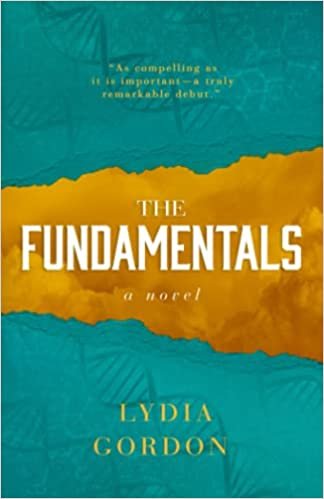Book Review: The Fundamentals
The Fundamentals. Lydia Gordon, Wells Street Press, 18 October 2022, Paperback and eBook, 376 pages.
Reviewed by marssie Mencotti.
In a small downstate Illinois town, a large evangelical church with a powerful preacher named Cyrus Bell has decided that secular and faith-based lives should not coexist. The character is a demagogue whose conceit is that he talks directly to and agrees with a merciless, misogynistic, punishing God. They preach that this deity reduces life to its fundamentals, which are defined by man using scripture and imagination and rejecting science and experience. It’s taking a toll on the lives of the town’s church members who fluctuate between a promise of rapture and uncomfortable but strict subjugation to rules set by male “overlords.” The author is helping readers understand that the fundamentals upon which our free and individual lives are based are being shoved out of kilter.
Alexa and her daughter Lucy are forced by a family will and domestic need to settle and rebuild an ancestral home in this rural setting. All seems bucolic and brimming with possibility, but they hadn’t realized the pervasive strength of religious bullying. At first, it’s subtle, but hate becomes a matter of faith-versus-science for what is ironically called a curriculum of “Intelligent Design.” This debate is currently occurring all over small-town America and in some statehouses as well. Author Lydia Gordon writes not only a compelling novel, but an important cautionary tale.
Gordon is the pen name of Chicago-area writer and poet Cynthia Todd Quam. Quam holds a BA from Columbia College and an MFA from Bennington College. Her poetry has appeared in Columbia Poetry Review, After Hours, The Humanist, The Chicago Tribune, and The Nancy Drew Anthology (Silver Birch Press), among other publications. She is an Eileen Lannan Poetry Prize recipient. In 2021, she was a top-10 winner in the Writer’s Digest Poetry Awards and earned an honorable mention in the Chicago Writer’s Association First Chapter Contest. The Fundamentals is her debut novel.
Alexa and Lucy move to Ecstasy, Illinois. Lucy is an angry teenager separated from the friends she has known all her life. Alexa is a long-suffering but capable architect mother. Lucy’s anger at her displacement and Alexa’s willingness to permit Lucy's latitude to decide her friends are soon in conflict. One thing they did agree on was Lucy’s pursuit of science, a field she adores for experimentation and the opportunity to discover new science. Once young love enters the picture, Lucy can only see Jake, even though he is fundamentally ruled by his evangelical church, belief in male domination, brutal interpretation of premarital intimacy, and denial of the scientific method. They cross paths with Rachel, a young woman whom the church has expelled, and she serves as a voice for those who have lost their religious community and are foundering.
Alexa discovers a battle when she realizes that the Ecstasy Church is trying to pack the school board to push through the teaching of Intelligent Design—a curriculum that posits false data based on a narrow interpretation of the Bible. In essence, Intelligent Design takes the responsibility for life and science out of human hands and ascribes it to a distant and discriminatory God that can only be interpreted and enforced by a self-proclaimed preacher.
The challenges of being in a new place at a time in America where things seem out of control and various groups are struggling to wrest power wherever they can is challenging for mother and daughter. This novel is beautifully poised at a moment where things can go in a very bad direction. Alexa and Lucy are stuck. They have nowhere else to go. As Lucy fights to emerge as her own person, she flirts with a religion that provides glib morality and stiff penalties for any transgression. The discipline is comforting, at first. Alexa finds herself powerless because of a bit of naivete in this new culture and then finds that she has more strength than she knew. And there are others who feel the same way.
This book may seem like it is building a simple argument for freedom of speech and religion, but it is more. It’s about a difficult space where most Americans believe that freedom of expression in all ways should be tolerated as individual liberties. It becomes shocking and surprising when people who should be bringing a message of peace and love embrace hate and exclusion. It is in this gap between surprise and possible entrenchment of power-seeking demagoguery that things can happen to endanger the freedom of all Americans. One thing that is changing is how children are educated—a trend that continues to divide us.
Gordon dips into the heart and soul of innocent Americans who wake up to a war still being fought from centuries ago. She reminds us that there are still witch burners among us.
It is a clear-eyed vision of how we all must encourage unlikely heroes, like Alexa, to run for school board, city council, and even Congress so that the country can keep a level head in tolerating and accepting our differences without conceding democracy to a policy of exclusion and a return to segregation. This book also understands that it’s not any one organized religion that is the culprit, but the individual people who twist and misinterpret religion as the right to bully and traumatize others.
We might thank Gordon for this cautionary tale to help us understand a bit better what can happen if we sleep through the threats surrounding us without waking up and speaking out.

